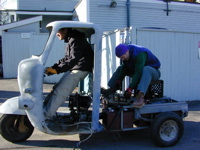Commutamatic IV
microfurthur
updated in May 2016, after the winter in which the chassis was stripped down and given, with all the parts I had, to local enthusiast Matt R.
Jay H. gave it to me in pretty much the exact same form in about 2004... we are, after all, just caretakers for these time travelers.
At Energy Savings Fair in Lexington, Massachusetts, October 4, 2009. (Thank you, Lexington GWAC!)
|
The dimensions of hybridness*
1. Internal-Combustion Electric.
Like trains, tugboats and
submarines (to name a few) going back to
about 1900, the hybrid combination of a diesel engine to run a
generator to charge batteries is tried and true. (By the way,
gasoline-electric hybrids are not new with the Honda Insight or Toyota
Prius. Ferdinand Porsche (yes, that
Porsche) built the first one in 1899.
2. Removable Auxiliary Power
Unit #1, the multi-fuel diesel trailerThis vehicle has a calculated
(more data later) range of about 20
miles, enough to make my commute. (I will have to charge at both ends
or make it work a little better if the range is any less!) The APU is
on a trailer, and can be left behind. I can charge while pulling or
while parked with the APU attached.
The diesel engine can run on
petrodiesel or biodiesel and
on SVO
(straight vegetable oil) or on WVO (waste vegetable oil), or, as the
real veg-heads prefer, UVO (used vegetable oil), because it isn't waste
if it's fuel for your vehicle! And, I think this makes me a real
veg-head, because I agree that UVO is not WVO unless it hasn't got any
other
use. What are the chances of that?
3. Removable APU #2, "Propane Jenny," the propane generator.This Auxilary Power Unit rides on
the back deck of the vehicle. It employs a Honda 5-hp internal
combustion engine (I.C.E.) that I converted, with some students back in
about 2000, using a kit from some Web outfit, to run on propane. It delivers straight
DC at ~53v to charge the battery pack directly, or, at times of peak
demand, to support the current delivery by the battery pack.
4. Removable APU #3, "Gas Colman," the conventional generator.
This Auxilary Power Unit rides on
the back deck of the vehicle, too. It is a 10-year-old,
plain-as-anything off-the-shelf generator. Briggs and Stratton 8-hp gas
I.C.E. running a generator head by direct drive. This delivers 110v AC
for the same charing system you would use to plug the electic vehicle
into a household wall socket. Speaking of which, hybridness #5...
5. Bonus! You can plug it into the wall, too. It's also chargeable in the old-fashioned way: Plug it in to household current.
*get a dose of data on what a
hybrid vehicle is at Wikipedia. |
||
| Read the FAQ that accompanies Microfurthur at shows and stuff here. | ||
1965 Lambro 550, a hard-luck time-traveler, converted to electric with a couple of my students and painted by my wife and daughter... the vehicle. |
 Brian W. at the helm, me holding wires together on the back deck, first test drive, December '04. |
|
| The charging units. at the core of charging system #1, the trailer, is a 25-year-old one-cylinder diesel from a piece of highway equipment. Then you add a used propane tank, some flexible exhaust tubing, a couple of gallons of vegetable oil, and there's one auxiliary power unit. There's also a conventional generator, and a propane-fired 5-hp Honda that generates straight DC. Check 'em out. |
 |
|
Back to Max Hall's home page.